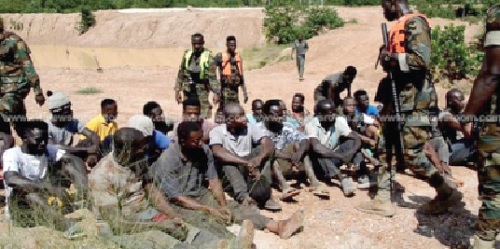
Ghana continues to struggle to come to terms with the August 6 helicopter tragedy.
On ‘Black Wednesday’, eight Ghanaians, including two government ministers, lost their lives.
The eight were killed when a military helicopter crashed in the central Ashanti Region.
According to the Ghana Armed Forces, the helicopter took off from Kotoka International Airport, Accra, just after 9.00am.
It headed northwest towards the gold-mining area for an event about tackling illegal mining – that is, galamsey – at the Obuasi Black Park in Obuasi, Ashanti Region.
During the short journey, the helicopter went off the radar. The helicopter’s wreckage was found later; there were no survivors.
Illegal mining, or ‘galamsey’, has significantly harmed Ghana’s environment and jeopardised essential resources such as cocoa, the nation’s key cash crop.
Contaminated water, degraded farmland, and polluted soil threaten agricultural livelihoods.
Efforts by successive governments to combat this issue have often faltered, caught between political will and economic interests.
However, the current administration is prioritising addressing illegal mining and promoting responsible, regulated practices.
On the tragic day known as ‘Black Wednesday’, the helicopter was on its way to Obuasi to launch ‘responsible’ mining.
The deaths shocked the nation, prompting the parliamentary Minority to label the event a national disaster.
In recognition of their contributions and to honour them, a state funeral was held.
This funeral, however, should not mark the end of this tragedy.
The nation’s collective grief must inspire a united, sustained effort to combat galamsey.
Transitioning to sustainable mining practices is crucial both for environmental health and economic equity.
Pursued with commitment and focus, ending galamsey would lead to lasting benefits for citizens, protect vital farmland and water sources, and foster a healthier ecosystem for future generations.
Is the word of God unimpeachable?
Following the tragedy, people claiming to be ‘prophets’ came forward, declaring that they had foretold the fateful crash. Social media was replete with videos purporting to show evidence of such prophetic declarations.
Several ‘prophets’ claimed that they warned that the tragedy was imminent, yet nothing was done.
Political prophecies are a key feature of Christianity in Ghana. Self-proclaimed ‘prophets’ seek celebrity status with their utterings, which seek to either challenge political authorities or attract prominent politicians as followers.
Often, prophecies, especially from contemporary prophets in neo-Pentecostal movements, focus on political, economic and social issues.
This is not surprising given tough economic times and widespread economic insecurity in Ghana.
Prophecies, whether they refer to the death of a prominent person, impending danger or calamity, the high cost of living, food shortages or political stability, attract much popular attention.
Many Ghanaians believe that prophecies help them keep track of events beyond their control; not only Christians, but also Muslims and followers of Ghana’s indigenous religions, are keen followers of the country’s self-proclaimed ‘prophets’.
Ghana, like many other African countries, such as Nigeria and South Africa, has recently witnessed a significant increase in charismatic Pentecostal churches.
Some of these churches are organised around their ‘prophets’, perceived as possessing unique gifts that enable them to mediate between humanity and the divine.
A prophet’s ability to attract popular attention is neither part of a democratic process, nor is their pronouncement subject to scrutiny.
Prophets assert that God conveys His messages directly to them, and that it is both impertinent and unacceptable to question or challenge alleged revelations which are by definition beyond the comprehension of ordinary individuals.
In other words, questioning, debating, or doubting the prophet’s word is regarded as a nefarious scheme to undermine the authority of the self-proclaimed man of God.
Some Charismatic Pentecostal prophets may intimidate critics with threats of eternal damnation, illness, or poverty with no spiritual accountability.
What’s the way forward?
The tragedy of Black Wednesday underscores not only the fragility of existence but also the profound challenges embedded within Ghana’s socio-political and spiritual realms.
This incident transpired amid already grave economic conditions and pervasive insecurity, fuelling predictions of doom, hardship and misfortune. Such forebodings often flourish in an atmosphere of despair.
A society contending with environmental degradation, economic instability and political distrust creates a ripe environment for prophetic assertions of divine foresight.
Conversely, this calamity can catalyse transformation.
The objective of ending illegal mining and transitioning to responsible, regulated practices could emerge as a new visionary goal—not one delivered from the pulpit in fear, but one inspired by national commitment and proactive measures.
If Ghana manages to convert its mineral resources into sustainable development, ordinary citizens will feel more empowered and less susceptible to often manipulative predictions of doom.
A focus on prosperity and rejuvenated ecosystems can shift prophetic discourse from foretelling disasters to celebrating national renewal and optimism.
The loss of the eight, whom many see as national heroes, should be commemorated not merely as a national tragedy but as an ethical imperative: their unintended sacrifice must galvanise a collective resolve, led by purposeful and sustained government action, to eradicate illegal mining.
Aligning political will with community efforts and spiritual accountability can offer Ghana a way forward, a future where prophecies do not point only to disaster but to a future of shared prosperity and environmental equilibrium.
The writers are an Emeritus Professor of Politics, London Metropolitan University, UK and a Political Scientist



